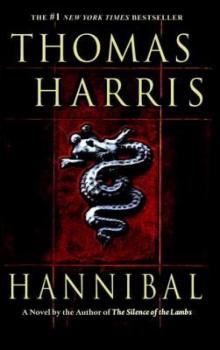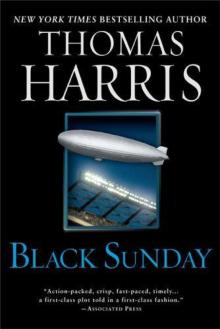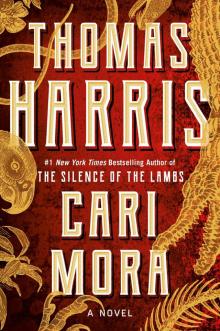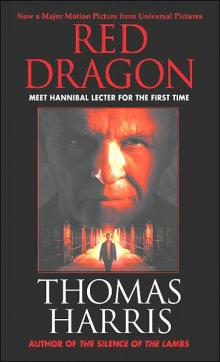- Home
- Thomas Harris
Hannibal Page 9
Hannibal Read online
Page 9
“Did you ever think when he escaped that he might come after you?”
Barney shook his huge head. “He told me once that, whenever it was ‘feasible,’ he preferred to eat the rude. ‘Free-range rude,’ he called them.” Barney laughed, a rare sight. He has little baby teeth and his amusement seems a touch maniacal, like a baby’s glee when he blows his pabulum in a goo-goo uncle’s face.
Starling wondered if he had stayed underground with the loonies too long.
“What about you, did you ever feel … creepy after he got away? Did you think he might come after you?” Barney asked.
“No.”
“Why?”
“He said he wouldn’t.”
This answer seemed oddly satisfactory to them both.
The eggs arrived. Barney and Starling were hungry and they ate steadily for a few minutes. Then …
“Barney, when Dr. Lecter was transferred to Memphis, I asked you for his drawings out of his cell and you brought them to me. What happened to the rest of the stuff—books, papers? The hospital doesn’t even have his medical records.”
“There was this big upheaval.” Barney paused, tapping the salt shaker against his palm. “There was a big upheaval, you know at the hospital. I got laid off, a lot of people got laid off, and stuff just got scattered. There’s no telling—”
“Excuse me?” Starling said, “I couldn’t hear what you said for the racket in here. I found out last night that Dr. Lecter’s annotated and signed copy of Alexandre Dumas’ Dictionary of Cuisine came up at a private auction in New York two years ago. It went to a private collector for sixteen thousand dollars. The seller’s affidavit of ownership was signed ‘Cary Phlox.’ You know ‘Cary Phlox,’ Barney? I hope you do because he did the handwriting on your employment application at the hospital where you’re working but he signed it ‘Barney.’ Made out your tax return too. Sorry I missed what you were saying before. Want to start over? What did you get for the book, Barney?”
“Around ten,” Barney said, looking straight at her.
Starling nodded. “The receipt says ten-five. What did you get for that interview with the Tattler after Dr. Lecter escaped?”
“Fifteen G’s.”
“Cool. Good for you. You made up all that bull you told those people.”
“I knew Dr. Lecter wouldn’t mind. He’d be disappointed if I didn’t jerk them around.”
“He attacked the nurse before you got to Baltimore State?”
“Yes.”
“His shoulder was dislocated.”
“That’s what I understand.”
“Was there an X ray taken?”
“Most likely.”
“I want the X ray.”
“Ummmm.”
“I found out Lecter autographs are divided into two groups, the ones written in ink, or preincarceration, and crayon or felt-tip writing from the asylum. Crayon’s worth more, but I expect you know that. Barney, I think you have all that stuff and you figure on parceling it out over the years to the autograph trade.”
Barney shrugged and said nothing.
“I think you’re waiting for him to be a hot topic again. What do you want, Barney?”
“I want to see every Vermeer in the world before I die.”
“Do I need to ask who got you started on Vermeer?”
“We talked about a lot of things in the middle of the night.”
“Did you talk about what he’d like to do if he was free?”
“No. Dr. Lecter has no interest in hypothesis. He doesn’t believe in syllogism, or synthesis, or any absolute.”
“What does he believe in?”
“Chaos. And you don’t even have to believe in it. It’s self-evident.”
Starling wanted to indulge Barney for the moment.
“You say that like you believe it,” she said, “but your whole job at Baltimore State was maintaining order. You were the chief orderly. You and I are both in the order business. Dr. Lecter never got away from you.”
“I explained that to you.”
“Because you never let your guard down. Even though in a sense you fraternized—”
“I did not fraternize,” Barney said. “He’s nobody’s brother. We discussed matters of mutual interest. At least the stuff was interesting to me when I found out about it.”
“Did Dr. Lecter ever make fun of you for not knowing something?”
“No. Did he make fun of you?”
“No,” she said to save Barney’s feelings, as she recognized for the first time the compliment implied in the monster’s ridicule. “He could have made fun of me if he’d wanted to. Do you know where the stuff is, Barney?”
“Is there a reward for finding it?”
Starling folded her paper napkin and put it under the edge of her plate. “The reward is my not charging you with obstruction of justice. I gave you a walk before when you bugged my desk at the hospital.”
“That bug belonged to the late Dr. Chilton.”
“Late? How do you know he’s the late Dr. Chilton?”
“Well, he’s seven years late anyway,” Barney said. “I’m not expecting him anytime soon. Let me ask you, what would satisfy you, Special Agent Starling?”
“I want to see the X ray. I want the X ray. If there are books of Dr. Lecter’s, I want to see them.”
“Say we came upon the stuff, what would happen to it afterward?”
“Well, the truth is I can’t be sure. The U.S. Attorney might seize all the material as evidence in the investigation of the escape. Then it’ll molder in his Bulky Evidence Room. If I examine the stuff and find nothing useful in the books, and I say so, you could claim that Dr. Lecter gave them to you. He’s been in absentia seven years, so you might exercise a civil claim. He has no known relatives. I would recommend that any innocuous material be handed over to you. You should know my recommendation is at the low end of the totem pole. You wouldn’t ever get the X ray back probably or the medical report, since they weren’t his to give.”
“And if I explain to you that I don’t have the stuff?”
“Lecter material will become really hard to sell because we’ll put out a bulletin on it and advise the market that we’ll seize and prosecute for receiving and possession. I’ll exercise a search and seizure warrant on your premises.”
“Now that you know where my premises is. Or is it premises are?”
“I’m not sure. I can tell you, if you turn the material over, you won’t get any grief for having taken it, considering what would have happened to it if you’d left it in place. As far as promising you’d get it back, I can’t promise for sure.” Starling rooted in her purse for punctuation. “You know, Barney, I have the feeling you haven’t gotten an advanced medical degree because maybe you can’t get bonded. Maybe you’ve got a prior somewhere. See? Now look at that—I never pulled a rap sheet on you, I never checked.”
“No, you just looked at my tax return and my job application is all. I’m touched.”
“If you’ve got a prior, maybe the USDA in that jurisdiction could drop a word, get you expunged.”
Barney mopped his plate with a piece of toast. “You about finished? Let’s walk a little.”
“I saw Sammie, remember he took over Miggs’s cell? He’s still living in it,” Starling said when they were outside.
“I thought the place was condemned.”
“It is.”
“Is Sammie in a program?”
“No, he just lives there in the dark.”
“I think you ought to blow the whistle on him. He’s a brittle diabetic, he’ll die. Do you know why Dr. Lecter made Miggs swallow his tongue?”
“I think so.”
“He killed him for offending you. That was just the specific thing. Don’t feel bad—he might have done it anyway.”
They continued past Barney’s apartment house to the lawn where the dove still circled the body of its dead mate. Barney shooed it with his hands. “Go on,” he said to the bird. “That�
��s long enough to grieve. You’ll walk around until the cat gets you.” The dove flew away whistling. They could not see where it lit.
Barney picked up the dead bird. The smooth-feathered body slid easily into his pocket.
“You know, Dr. Lecter talked about you a little, once. Maybe the last time I talked to him, one of the last times. The bird reminds me. You want to know what he said?”
“Sure,” Starling said. Her breakfast crawled a little, and she was determined not to flinch.
“We were talking about inherited, hardwired behavior. He was using genetics in roller pigeons as an example. They go way up in the air and roll over and over backwards in a display, falling toward the ground. There are shallow rollers and deep rollers. You can’t breed two deep rollers or the offspring will roll all the way down, crash and die. What he said was Officer Starling is a deep roller, Barney. We’ll hope one of her parents was not.’”
Starling had to chew on that. “What’ll you do with the bird?” she asked.
“Pluck it and eat it,” Barney said. “Come on to the house and I’ll give you the X ray and the books.”
Carrying the long package back toward the hospital and her car, Starling heard the surviving mourning dove call once from the trees.
CHAPTER
13
THANKS TO the consideration of one madman and the obsession of another, Starling now had for the moment what she always wanted, an office on the storied subterranean corridor at Behavioral Science. It was bitter to get the office this way.
Starling never expected to go straight to the elite Behavioral Science section when she graduated from the FBI Academy, but she had believed that she could earn a place there. She knew she would spend several years in field offices first.
Starling was good at the job, but not good at office politics, and it took her years to see that she would never go to Behavioral Science, despite the wishes of its chief, Jack Crawford.
A major reason was invisible to her until, like an astronomer locating a black hole, she found Deputy Assistant Inspector General Paul Krendler by his influence on the bodies around him. He had never forgiven her for finding the serial killer Jame Gumb ahead of him, and he could not bear the press attention it brought her.
Once Krendler called her at home on a rainy winter night. She answered the telephone, in a robe and bunny slippers with her hair up in a towel. She would always remember the date exactly because it was the first week of Desert Storm. Starling was a tech agent then and she had just returned from New York, where she had replaced the radio in the Iraqi U.N. Mission’s limousine. The new radio was just like the old one, except it broadcast conversations in the car to a Defense Department satellite overhead. It had been a dicey maneuver in a private garage and she was still edgy.
For a wild second, she thought Krendler had called to say she’d done a good job.
She remembered the rain against the windows and Krendler’s voice on the phone, speech a little slurred, bar noises in the background.
He asked her out. He said he could come by in half an hour. He was married.
“I think not, Mr. Krendler,” she said and pushed the record button on her answering machine, it making the requisite legal beep, and the line went dead.
Now, years later in the office she had wanted to earn, Starling penciled her name on a piece of scrap paper and Scotch-taped it to the door. That wasn’t funny and she tore it off again and threw it in the trash.
There was one piece of mail in her in-tray. It was a questionnaire from The Guinness Book of World Records, which prepared to list her as having killed more criminals than any other female law enforcement officer in United States history. The term criminals was being used advisedly, the publisher explained, as all of the deceased had multiple felony convictions and three had outstanding warrants. The questionnaire went into the trash along with her name.
She was in her second hour of pecking away at the computer workstation, blowing stray strands of hair out of her face, when Crawford knocked on the door and stuck his head inside.
“Brian called from the lab, Starling. Mason’s X ray and the one you got from Barney are a match. It’s Lecter’s arm. They’ll digitize the images and compare them, but he says there’s no question. We’ll post everything to the secure Lecter VICAP folder.”
“What about Mason Verger?”
“We tell him the truth,” Crawford said. “You and I both know he won’t share, Starling, unless he gets something he can’t move on himself. But if we try to take over his lead in Brazil at this point, it’ll evaporate.”
“You told me to leave it alone and I did.”
“You were doing something in here.”
“Mason’s X ray came by DHL Express. DHL took the bar code and label information and pinpointed the pickup location. It’s in the Hotel Ibarra in Rio.” Starling raised her hand to forestall interruption. “This is all New York sources, now. No inquiries at all in Brazil.
“Mason does his phone business, a lot of it, through the switchboard of a sports book in Las Vegas. You can imagine the volume of calls they take.”
“Do I want to know how you found that out?”
“Strictly legit,” Starling said. “Well, pretty much legit—I didn’t leave anything in his house. I’ve got the codes to look at his phone bill, that’s all. All the tech agents have them. Let’s say he obstructs justice. With his influence, how long would we have to beg for a warrant to trap and trace? What could you do to him anyway if he was convicted? But he’s using a sports book.”
“I see it,” Crawford said. “The Nevada Gaming Commission could either tap the phone or squeeze the sports book for what we need to know, which is where the calls go.”
She nodded. “I left Mason alone just like you said.”
“I can see that,” Crawford said. “You can tell Mason we expect to help through Interpol and the embassy. Tell him we need to move people down there and start the framework for extradition. Lecter’s probably committed crimes in South America, so we better extradite before the Rio police start looking in their files under Cannibalismo. If he’s in South America at all. Starling, does it make you sick to talk to Mason?”
“I have to get in the mode. You walked me through it when we did that floater in West Virginia. What am I saying, ‘floater.’ She was a person named Fredrica Bimmel, and, yes, Mason makes me sick. A lot of stuff makes me sick lately, Jack.”
Starling surprised herself into silence. She had never before addressed Section Chief Jack Crawford by his first name, she had never planned to call him “Jack” and it shocked her. She studied his face, a face famously hard to read.
He nodded, his smile wry and sad. “Me too, Starling. Want a couple of these Pepto-Bismol tablets to chew before you talk to Mason?”
Mason Verger did not bother to take Starling’s call. A secretary thanked her for the message and said he’d return her call. But he didn’t get back to her personally. To Mason, several places higher on the notification list than Starling, the X ray match was old news.
CHAPTER
14
MASON KNEW that his X ray was truly of Dr. Lecter’s arm well before Starling was told, because Mason’s sources within the Justice Department were better than hers.
Mason was told in an E-mail message signed with the screen name Token287. That is the second screen name of U.S. Representative Parton Vellmore’s assistant on the House Judiciary Committee. Vellmore’s office had been E-mailed by Cassius 199, the second screen name of the Justice Department’s own Paul Krendler.
Mason was excited. He did not think Dr. Lecter was in Brazil, but the X ray proved that the doctor now had the normal number of fingers on his left hand. That information meshed with a new lead from Europe on the doctor’s whereabouts. Mason believed the tip came from within Italian law enforcement and it was the strongest whiff of Lecter he had had in years.
Mason had no intention of sharing his lead with the FBI. Owing to seven years of relentless effort,
access to confidential federal files, extensive leafleting, no international restrictions and large expenditures of money, Mason was ahead of the FBI in the pursuit of Lecter. He only shared information with the Bureau when he needed to suck its resources.
To keep up appearances, he instructed his secretary to pester Starling for developments anyway Mason’s tickler file prompted the secretary to call her at least three times a day
Mason immediately wired five thousand dollars to his informant in Brazil to pursue the source of the X ray The contingency fund he wired to Switzerland was much larger and he was prepared to send more when he had hard information in hand.
He believed that his source in Europe had found Dr. Lecter, but Mason had been cheated on information many times and he had learned to be careful. Soon proof would come. Until it did, to relieve the agony of waiting Mason concerned himself with what would happen after the doctor was in his hands. These arrangements had also been long in the making, for Mason was a student of suffering….
God’s choices in inflicting suffering are not satisfactory to us, nor are they understandable, unless innocence offends Him. Clearly He needs some help in directing the blind fury with which He flogs the earth.
Mason came to understand his role in all of this in the twelfth year of his paralysis, when he was no longer sizeable beneath his sheet and knew that he would never rise again. His quarters at the Muskrat Farm mansion were completed and he had means, but not unlimited means, because the Verger patriarch, Molson, still ruled.
It was Christmas in the year of Dr. Lecter’s escape. Subject to the quality of feelings that commonly attend Christmas, Mason was wishing bitterly that he had arranged for Dr. Lecter to be murdered in the asylum; Mason knew that somewhere Dr. Lecter was going to and fro in the earth and walking up and down in it, and very likely having a good time.
Mason himself lay under his respirator, a soft blanket covering all, a nurse standing by, shifting on her feet, wishing she could sit down. Some poor children had been bussed to Muskrat Farm to carol. With the doctor’s permission, Mason’s windows were opened briefly to the crisp air and, beneath the windows, holding candles in their cupped hands, the children sang.

 The Silence of the Lambs
The Silence of the Lambs Red Dragon
Red Dragon Hannibal
Hannibal Black Sunday
Black Sunday Cari Mora
Cari Mora Hannibal Rising
Hannibal Rising Red Dragon hl-1
Red Dragon hl-1 The Silence of the Lambs (Hannibal Lecter)
The Silence of the Lambs (Hannibal Lecter)